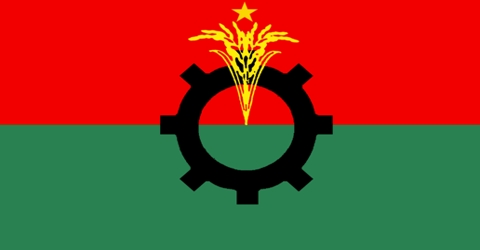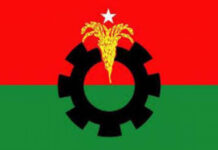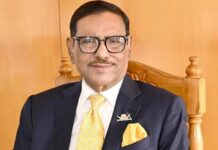With its leaders and activists in hiding or simply inactive, BNP’s organisational structure is in poor shape. Under these circumstances, the party’s movement, election and all sorts of programmes are mainly restricted to statements.
Party insiders said, BNP had not remained out of power for such a long spell of time in the recent past. On top of that, for a long time leaders and activists at all levels of the party have been in jail, were being abducted, mysteriously disappearing and subject to all sorts of oppression and repression. As a result, the leaders and workers of the party were not responding to the calls and efforts of the party’s top leadership to actively take to the field.
BNP’s organisational weakness and leadership crisis was quite apparent in the recent city corporation elections in Dhaka (North and South) and Chittagong.
At a press conference, party chairperson Khaleda Zia had called for a “silent revolution” by positioning the party’s leaders and activists at all the polling centres. They were instructed only to leave the centres after the counting was over. But that did not happen. BNP agents didn’t even turn up at 90% of the centres. The party’s leaders and activists were silent, in fear of arrest and torture.
BNP leaders have said, the party was unable to make the three-month movement starting from 6 January a success, because of organisational weaknesses in Dhaka. These weaknesses were further revealed during the city corporation polls. Like the movement, during the elections too most of the BNP’s important leaders were nowhere to be seen. After the movement and now the election, the leaders and workers of the party are extremely frustrated with the inactivity within the party leadership.
BNP standing committee member Mahbubur Rahman has said, “It cannot be denied that certain organisational weaknesses of BNP have come to light in the election and the movement. But it is the government, the election commission and the law enforcement agencies that are mainly responsible for this.”
Over 10 thousand leaders and activists of BNP, including the party’s acting secretary general Mirza Fakhrul Islam Alamgir, have been arrested over the last four months. Before that, on 6 January, BNP standing committee member Gaeswar Chandra Roy was arrested. In the three-month long movement from January till March followed by the city corporation elections in April, it was only three or four leaders, including Khaleda Zia herself, who were seen to be active.
The party’s standing committee members Moudud Ahmed and ASM Hannan Shah were seen to be active after a long time, in the city corporation elections. They were silent during the movement, along with the other standing committee leaders RA Ghani, Jamir Uddin Sircar, MK Anwar, Sarwari Rahman and Rafiqul Islam Miah.
Tariqul Islam and Mirza Abbas are in hiding and Nazrul Islam Khan was in the chairperson’s Gulshan office. Abdul Moyeen Khan was at times active and at time inactive. It is said that when a certain foreign diplomat invited him to the embassy on some important matter, he did not go. He was too scared to leave home.
Among three other members of BNP standing committee, Khandakar Mosharraf Hossain is in jail on corruption charges, Salah Uddin Quader Chowdhury on charges of crimes against humanity in 1971, and Gaeswar Roy on criminal charges. Tarique Rahman is in London and Shamsul Islam is ailing. Khandakar Delwar Hossain passed away.
The standing committee leaders were so scared during the movement, that they all avoided the media except for Mahbubur Rahman. After the city corporation elections, it is back to square one. Three standing committee members who had been active over the past few days, are now unavailable over the phone.
There are seven joint secretaries general in BNP central committee. They play an important role in organisational matters, alongside the secretary general. After Mirza Fakhrul Islam was arrested, Ruhul Kabir Rizvi Ahmed was given responsibility. Then he was arrested and the responsibility was given to Salah Uddin Ahmed. Salah Uddin Ahmed has been missing for the last 53 days. Next the responsibility was handed over to Barkat Ullah who was in hiding. Now Asaduzzaman Ripon is the party’s spokesperson.
Joint secretary general Mohammed Shahjahan had already been arrested. Another joint secretary general Mizanur Rahman Minu is in hiding. Aman Ullah Aman has been inactive from the outset. Mahbub Uddin Khokan is busy with his legal profession.
BNP’s international relations or foreign affairs wing is also in shambles. In January at the beginning of the movement, the chairperson’s foreign affairs advisor and important person in the party’s foreign affairs wing, Reaz Rahman, was shot and injured. Prior to that, former foreign secretary Shamsher Mobin Chowdhury was arrested. And member of BNP’s foreign affairs wing Sabih Uddin Ahmed’s car was set on fire by miscreants when he had gone to call on Khaleda Zia at her Gulshan office. He remained at home for long after that. On 11 February when British High Commissioner Robert Gibson called upon Khaleda Zia at her office in Gulshan, Sabih Uddin also went.
During the movement and the election, only seven or eight of the chairperson’s 32-person advisory council were active. M Osman Faruk, Abdul Awal Mintoo, Amir Khasru Mahmud Chowdhury, Khandakar Mahbub Hossain, Enam Ahmed Chowdhury, Ahmed Azam Khan, Major General (retd) Ruhul Azam, Shawkat Mahmud and AZM Zahid Hossain were involved in the movement and the election. Two members of the advisory council are under arrest, MA Mannan (Gazipur city mayor) and Shamsuzzaman Dudu. Three of the advisors have passed away.
A standing committee member of the party told Prothom Alo, “The party hasn’t held a central council since 2009. The top leadership is deciding on the movements and programmes. Other than two or three leaders, the rest are in the dark.” He said that if BNP is to emerge from its organisational weakness, it will have to appoint leaders by merit, not personal preference.
Source: Prothom Alo










